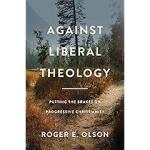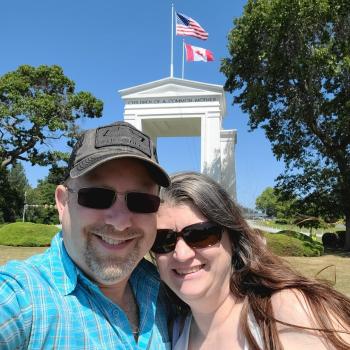Sabah is a 40-year-old unmarried Muslim woman living in Toronto. She's a bit dowdy, awkward, and quiet. She is her mother's live-in caretaker and is under her very traditional brother's authority. The memory of her less-traditional father spurs Sabah to do something a bit daring and that enables her to meet and fall in love with a white, non-religious man named Stephen. Sabah struggles to hide this relationship from her family even as she blooms into her own daring, confident person.
Like My Big Fat Greek Wedding, Sabah (2005) follows a very familiar story line. Repressed girl steps out of box, meets boy, hides boy, is discovered; dramatic confrontation, reconciliation, and happy ending ensue. What I find interesting about both of these movies is that it centers on a religious woman falling for a secular man, and that her liberation is to be found in the secular world rather than the religious one. I also find it fascinating that there are underlying themes suggesting that women should be less religious to find love and that women are what bring secular men to religion. That last theme is particularly biblical and reminiscent of the "soft feminism" of women from traditional cultures.
My last column also featured a film where women exuded a "soft," passive feminism. At the end of the film Arranged, one of the main characters remarks that they can make the men in their lives do whatever they want. In My Big Fat Greek Wedding, Toula's mother asserts that although the man is the head of the house, the woman is the neck, and can turn the head in any direction she wants. It is a curious, and I think unhelpful, idea that male authority in traditional cultures is somehow simply traditional women humoring traditional men's egos. In the case of secular men, the women are seen to be "rescuing" them from their bland flavorless lives, and the men themselves so enamored they are willing to make significant religious commitments for love's sake, not for the sake of their own soul.
In Sabah, you again have the dynamic of strong women only partially accepting the authority of a male relative. Though the tone is more subtle than in Greek Wedding, there is a feeling that these women see a brother as less wise and kind than themselves, and so I was pleased to see a secret of the brother's revealed at the end that saves him from the bumbling, blustering male stereotype. Stephen doesn't fare as well; he offers to convert to satisfy Sabah's family almost thoughtlessly. Embracing Islam, or any religion, shouldn't be as mindless as changing your socks, and yet this is how these movies portray conversion.
As in My Big Fat Greek Wedding, the real religion in Sabah is "Love" and in movies, Greek Orthodoxy and Islam fall to the side in pursuit of romantic happiness. It's implied that to find romantic love and domestic happiness you have to put some of the "religious nonsense" aside if you are a woman, or take on the trappings of religion without question if you are a man. The stereotype that women take religion too seriously, and men not seriously enough, is often accepted without question in films and literature. While I can think of several films that play to this stereotype off-hand, the only instance in entertainment media I can think of where the reverse is true is Bill's courtship of Ana in Big Love. (Shawn Doyle, who plays Bill's brother Joey on Big Love, plays Stephen in Sabah.) Is this recurring story due to Hollywood's reluctance to take on religion seriously, or is there something in our human psyche that needs this particular kind of romantic drama?
Despite my misgivings about some of the underlying religious themes, Sabah is a fantastic film—very funny and heartfelt with characters you genuinely come to care about. The ending unfolds in a surprising way and it's an interesting story about how families can become more rigid and uncompromising as a way of dealing with stress and tragedy. The blossoming that can happen when you give yourself room to move in your faith and relationships is a beautiful thing to behold. Watching Sabah blossom as she expands her horizons, both within and without her faith tradition, is inspiring. If you liked My Big Fat Greek Wedding and enjoy stories about love conquering all, you will enjoy Sabah. If you're interested in the stereotypes surrounding men and women when it comes to religion, this might be a good film to watch and discuss with friends and family.
Sabah is available on DVD and for streaming on Netflix at the time of writing.
12/16/2010 5:00:00 AM





